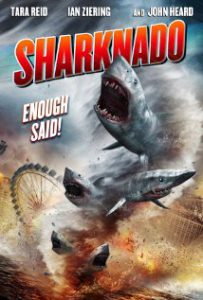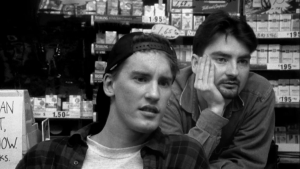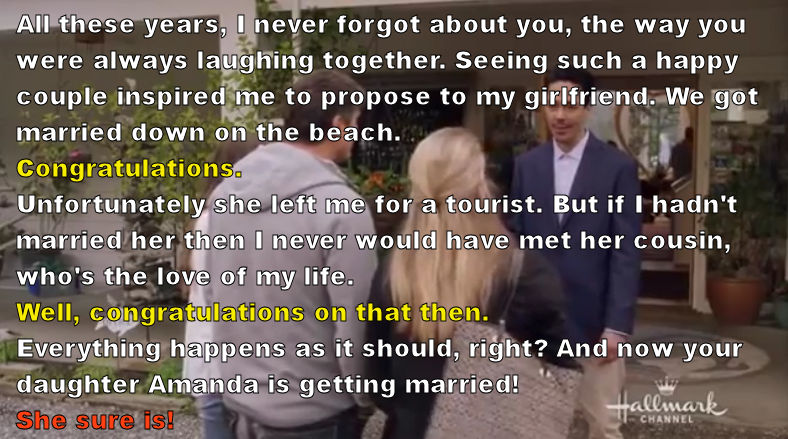With one set of holidays behind us and a couple on the horizon, we’re in the midst of what I would consider the Hallmark movie season. Though not all are strictly “Hallmark” movies, it is the time of year where a great deal of made for TV movies with similar themes flood networks that honestly have nothing better to show – particularly those aimed at “family”. These movies are easily identified by the fact they all have the same earmarks. First, they’re centered on a holiday or an event that happens to be family oriented. Second, their central plot (often the only plot) is generally based around that family dynamic one way or another. And third, the cast seems to have been slipped something before the cameras started rolling.

It’s never the cast’s fault, mind you – it’s just the way of the genre almost by default. Made cheaply and probably written on the back of literal Hallmark cards, these movies are the tried and true made for TV garbage that you watch only because you have nothing better to do. That’s not to say there isn’t an audience, there most certainly is, but most of that audience is either bored, lonely, or both. The few who don’t fill these requirements generally fit into the archetype that the characters themselves are based on. And even if you like some of them, you know, deep down, that they’re not exactly works of art. The scenarios rarely make sense, the characters are about as two dimensional as a greeting card, and any emotional weight is based primarily in how soft a target you happen to be.

And almost all of us know this. Though a few are fond of a couple of these, and others might have a straight up guilty pleasure of the bunch, we all know we’d rather be doing something else if we had the choice. An entire channel is devoted to these movies, and few would willingly watch it, but a dedicated, nostalgia driven fanbase keeps the thing afloat. Once, when about to watch one of these movies, my friend – an avid romance fan – asked me why I was looking to torture myself. Simply put: I was morbidly curious.
So, it raises a question: how can a business based entirely on human emotions have so little a grasp on how those emotions actually work (and how do we avoid the same mistakes)?
Hallmark Moments

The most obvious cause for these things to be so lackluster and bland would be that you get what you pay for. Being the film equivalent of shovelware, these movies are really only meant to fill space and hit a specific emotion or idea that fits the network and/or season. Is it Christmas? Let’s make a really bland, unoffensive Christmas movie that’ll play in the background while people are chugging eggnog. Is it Valentines? Let’s make a cheap romance story that will be watched by people who have nothing better to do that day. Just don’t spend too much because these people are easy pickings. It seems to be the most obvious motive, and other places have certainly demonstrated that a lack of budget can still churn out some glorious pieces of crap.

But low budget movies need not necessarily be unoriginal, in fact it tends to go the other direction. Most low budget movies were made on the budget they have because no one else was willing to risk the money necessary to make it properly. You don’t look at Sharknado and think it was boring and cookie cutter – you just know it was done with the same sort of budget and concern for humanity as a North Korean space program. Budget movies tend to be the unique, ugly little step children of the film industry that still have some sort of charm (sometimes falling into the range of “so bad, it’s good”). In fact, some budget movies, despite their budget, even turn out to be genuinely good enough to be recognized for their efforts. Kevin Smith’s entire career started off of something he funded out of pocket.

Hallmark movies, on the other hand, are polished, clean and even downright photogenic. Any still image from one of these movies would be seen as nothing but professional and well produced, and in fact, sometimes they may even appear overproduced. The problem with these films doesn’t show up until you get to the actual speaking and acting parts of the production. Regardless of how talented or experienced the cast may be, they inevitably come off feeling stiff and unrealistic, more like androids pretending to be people than actual people. They appear to be working through the motions, following beats, to the point that you can feel the artificial nature most of the time. If the movie is based around romance you’ll usually find the leads have almost no chemistry at all, or if they do it is entirely despite what they’re actually saying. And these two aspects – the high polish but low emotional content – though standing at opposite ends of the spectrum, stem from the same root cause: a focus on those “hallmark moments”.

When writing any story you’ll usually start with the overall arcs of that story. In the genres that these TV movies are trying to mimic there could be plots such as star-crossed lovers, trying to find the one that got away, or rekindling love in a relationship where the passion long ago faded. For each of these arcs you may find additional smaller arcs, individual character arcs may not necessarily move in perfect parallel with the plot arc – instead focusing on the character’s personal journey instead. Maybe the thing getting in the way of the relationship is a dark secret or a career. In either of these cases, the character arcs have to be moved along to progress the plot. Along the way there will be scenes, of course, which give these different arcs that progression. However, sometimes, when the scenes are just right, often where the arcs intersect, you’ll have a “moment” – a memorable piece of the story where all of the pieces are just right and really leave an impression on the viewer.
Moments are great and almost everyone wants to create them. They can become breathtaking, iconic, or deeply emotional. Often they’ll even be anticipated, the audience excitedly waiting for them. On more than one occasion, regardless of the genre at hand, I’ve heard one of my friends express her anticipation for characters to kiss. This is a moment for her, a thing that she eagerly waits for. Meanwhile, another dear friend will generally wait for when a character is about to die. As the internet often says: “there are two kinds of people”.

But these moments are never created independently of the arcs, they’re born from it as the arcs naturally progress. When things are just right you find the scenes are building towards something, a natural progression of the elements that are pushing towards that moment they’ll eventually create. The man who’s been plotting his escape for decades finally digs his way out of the prison. The hero makes a great sacrifice to save a train full of passengers at the cost of his own body. The girl who lost her family to Kaiju is finally given a chance to fight back. A woman reunites with her estranged father in the midst of a great disaster. The ragtag band of rebel misfits make a dangerous, near suicidal list ditch run at a superior force, narrowly snatching victory from the jaws of defeat.

These are natural byproducts of the story, an event that results from everything to come before them in one way or another. And for most of these, as I mentioned them just now, you can picture the story and the image that I was talking about and why that moment meant so much. In fact, for some of them you can picture several. And when done right, these moments become something you never forget, and the events that led up to those moments are just as memorable as a result. Despite the fact these moments are the most impressive they form a gestalt with all the scenes leading up to them, they have no meaning without the rest of their story. The same is true of all forms of storytelling including novels, television, and even video games.
But that’s not how Hallmark movies are approached. What you get instead is a story approached from the moments first, the snapshots that they want you to remember, and begin to try to build backwards from there. You can see where these movies are going not because the plot is leading there but because you know that’s what’s supposed to happen. And every scene in between is generally built to be a moment itself. There is no gradual build to a great climax. Instead, what you get is a series of snapshots and feelings being strung together by otherwise pointless (but picture-perfect) filler in between.

The result is that the scenes between these “moments” are usually just there to transition from Moment A to Moment B. And the characters, as a result, are generally two dimensional caricatures designed to get you towards that picturesque moment as well. It becomes a mechanical procession of beats towards a contrived outcome. All other things involved in the story become mechanical by relation. No character’s actions can move against the flow because all actions are designed specifically for that flow. And characters outside of the main cast are even worse, generally there to simply provide exposition with little purpose.

And because all of these moments are clearly artificial and the scenes strung between them are obvious transitions, none of it feels natural. The characters can’t feel real when they’re so clearly on rails, more akin to animatronics with dialogue that was clearly programmed into them and actions they have no choice but to take. Inevitably, the story loses any emotional weight because you aren’t getting to that emotion of your own accord (at least, sober). Instead, you’re being shown something that is supposed to impact you, but has little more substance than if the same picture were published on the greeting cards that inspired them. They try to program you in the same way they program their characters and it rarely works.
But the point of this post is about more than my opinion of the genre. This is important beyond simply saying that I don’t like Hallmark movies because it’s a problem that can enter any genre. A great example is the work of Zack Snyder, the man responsible for the bulk of the DCEU right now. I recently came across an analysis of the problems in his movies which echoed my own sentiments far too well. Zack is known by many to be a man great with visuals, but often his films completely lack anything resembling emotional depth. Generally they’re a sequence of memorable iconography with little substance in between. Like the Hallmark movies, Zack’s movies are built around moments rather than a story, and it generally shows.
Sadly, it’s just far too easy for a writer to begin to make these mistakes in their own work. The moments that we picture in our minds can begin to override our actual stories and both become weaker as a result. Our eagerness to chase that perfect moment can cause us to neglect the build towards it. We stop caring about character motives, or why a scene is important, and we may even stop confirming any of it makes sense. And repeating these sorts of mistakes, regardless of genre, will ensure that those moments…
Become memorable for all the wrong reasons.
(I write novels. There are some moments in them, I hope. I’m also on twitter, where every 140 characters is a moment unto itself.)








92 thoughts on “Why “Hallmark” Movies Suck”